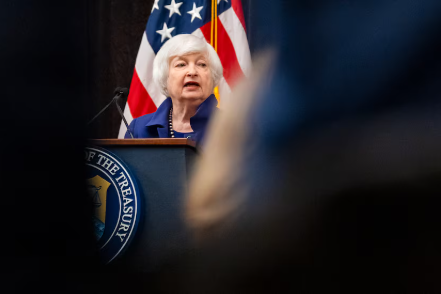
The U.S. Treasury told lawmakers in a letter Monday that it was hit by a cyberattack earlier in December, which the department has attributed to Chinese government hackers.
In the letter shared with senior U.S. House lawmakers, which TechCrunch has seen, the Treasury said the hackers gained remote access to certain Treasury employee workstations and had access to unclassified documents, in what it described as a “major cybersecurity incident.”
A spokesperson for BeyondTrust did not respond to a request for comment at press time.
The letter said the department engaged U.S. cybersecurity agency CISA for assistance and, as of December 30, it has “no evidence indicating the threat actor has continued access to Treasury information.”
The Treasury confirmed in the letter that it attributed the breach to a China state-sponsored advanced persistent threat group, indicating backing from the Chinese government. It’s not clear which group was behind the intrusion, and a spokesperson would not say.
In a brief statement, Treasury spokesperson Michael Gwin said that the hackers were able to “remotely access several Treasury user workstations and certain unclassified documents maintained by those users.”
“Treasury takes very seriously all threats against our systems, and the data it holds. Over the last four years, Treasury has significantly bolstered its cyber defense, and we will continue to work with both private and public sector partners to protect our financial system from threat actors,” the spokesperson said.
This is the latest cyberattack linked to China that has targeted the U.S. government in recent months. China-backed hackers dubbed Salt Tycoon were behind a wave of cyberattacks targeting U.S. phone companies and internet giants, including AT&T and Verizon, in a bid to get access to the private communications of senior U.S. government officials, including presidential candidates.
Liu Pengyu, a spokesperson for the Chinese Embassy in Washington, D.C., denied the U.S. government’s attribution of the cyberattack to the Chinese government, arguing that the United States did not present evidence of its claims.
In a shocking revelation, the US Treasury Department has disclosed that China was behind a “major” cyberattack that resulted in the unauthorized access of government documents. This brazen breach has sparked widespread concern among lawmakers, policymakers, and cybersecurity experts, who are calling for swift action to counter the escalating threat posed by China’s state-sponsored hacking operations.
The Attack: A “Major” Breach
According to sources familiar with the investigation, the cyberattack was detected in July 2023, when Treasury Department officials noticed suspicious activity on their networks. An immediate probe was launched, which revealed that hackers had gained unauthorized access to sensitive government documents, including confidential communications and policy briefs.
The Treasury Department has characterized the breach as “major,” indicating that the attackers had successfully infiltrated multiple layers of security and had access to a significant trove of sensitive information. While officials have declined to specify the exact nature of the compromised documents, sources suggest that they relate to US economic policy, trade negotiations, and national security matters.
China’s Involvement: A Pattern of Aggression
The US Treasury Department’s attribution of the attack to China marks the latest episode in a long-running saga of state-sponsored hacking by Beijing. Over the years, China has been implicated in numerous high-profile cyberattacks, including the 2014 breach of the US Office of Personnel Management (OPM), which compromised the sensitive data of millions of federal employees.
China’s cyber aggression has been driven by a combination of economic, strategic, and ideological motivations. Beijing has sought to exploit the vulnerabilities of US cyber networks to steal sensitive intellectual property, disrupt critical infrastructure, and gain a strategic advantage in the escalating competition between the two superpowers.
Consequences and Implications
The US Treasury Department’s revelation has sparked a flurry of concern among lawmakers, policymakers, and cybersecurity experts. The breach has been characterized as a “wake-up call” for the US government, highlighting the need for more robust cybersecurity measures and a more effective response to state-sponsored hacking operations.
The consequences of the breach are still being assessed, but officials warn that the compromised documents could be used by China to gain a strategic advantage in trade negotiations, undermine US economic policy, or even disrupt critical infrastructure.
Response and Mitigation
In response to the breach, the US Treasury Department has launched a comprehensive investigation, working closely with law enforcement agencies, cybersecurity experts, and other government departments. Officials have also implemented a range of mitigation measures, including:
1. Enhanced security protocols: The Treasury Department has strengthened its cybersecurity defenses, including the implementation of advanced threat detection systems and enhanced authentication protocols.
2. Network segmentation: Officials have segmented the Treasury Department’s network to limit the spread of malware and prevent future breaches.
3. Employee training: The department has launched a comprehensive training program to educate employees on cybersecurity best practices and the importance of vigilance in the face of escalating cyber threats.
Conclusion
The US Treasury Department’s revelation of a “major” cyberattack by China highlights the escalating threat posed by state-sponsored hacking operations. As the US government continues to grapple with the consequences of this breach, it is clear that a more robust and effective response is needed to counter the growing threat of Chinese cyber aggression.
Ultimately, the US government must prioritize cybersecurity as a national security imperative, investing in advanced threat detection systems, enhancing international cooperation, and developing a more effective deterrent strategy to counter the growing threat of state-sponsored hacking operations.
The recent cyberattack on the US Treasury Department, attributed to Chinese government-aligned hackers, highlights the importance of robust cybersecurity measures. While this incident is undoubtedly a concern, it also underscores the benefits of swift incident response, collaboration, and investment in cyber defense.
Enhanced Cybersecurity Measures
The US Treasury Department’s prompt response to the breach demonstrates the effectiveness of its cybersecurity protocols. By engaging with the Cybersecurity and Infrastructure Security Agency (CISA) and the FBI, the department was able to contain the attack and prevent further damage ¹.
International Cooperation
The incident also highlights the need for international cooperation in combating cyber threats. The US government’s attribution of the attack to Chinese hackers underscores the importance of diplomatic efforts to address cybersecurity concerns ².
Investment in Cyber Defense
The breach serves as a reminder of the importance of investing in cyber defense. The US Treasury Department’s efforts to bolster its cybersecurity over the past four years demonstrate the value of proactive measures in protecting sensitive information ¹.
Awareness and Vigilance
The incident raises awareness about the persistent threat of cyberattacks and the need for vigilance. By acknowledging the breach and taking steps to address it, the US Treasury Department demonstrates its commitment to transparency and accountability ³.
In summary, while the cyberattack on the US Treasury Department is a significant concern, it also highlights the benefits of robust cybersecurity measures, international cooperation, investment in cyber defense, and awareness and vigilance.



